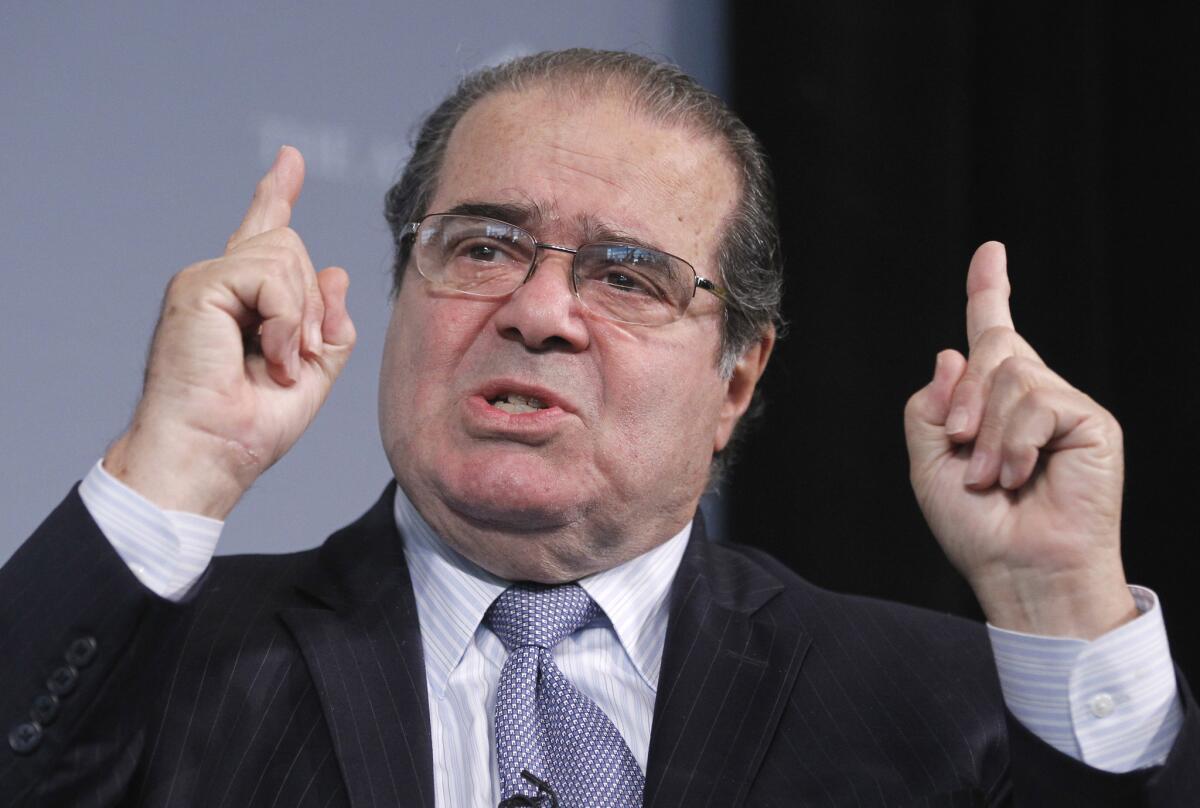Analysis:: Antonin Scalia’s dissent in same-sex marriage ruling even more scornful than usual

In his dissent in the Supreme Court’s same-sex marriage decision, Supreme Court Justice Antonin Scalia, seen here in 2011, showed contempt for his colleagues.
- Share via
Reporting from Washington — The legal world may have become inured to wildly rhetorical opinions by Justice Antonin Scalia, but his dissent in the Supreme Court’s same-sex marriage decision Friday reaches new heights for its expression of utter contempt for the majority of his colleagues.
In the course of just nine pages, Scalia calls the opinion of Justice Anthony M. Kennedy, with whom he has served on the court for 28 years, “a judicial Putsch,” “pretentious,” “egotistic,” “silly,” and filled with “straining-to-be-memorable passages.”
“This is a naked judicial claim to legislative — indeed, super-legislative — power; a claim fundamentally at odds with our system of government,” Scalia wrote. “A system of government that makes the people subordinate to a committee of nine unelected lawyers does not deserve to be called a democracy.”
In unusually personal terms, even for Scalia, he mocked Kennedy’s opening sentence.
“If, even as the price to be paid for a fifth vote, I ever joined an opinion for the court that began: ‘The Constitution promises liberty to all within its reach, a liberty that includes certain specific rights that allow persons, within a lawful realm, to define and express their identity,’ I would hide my head in a bag,” Scalia wrote in a footnote. “The Supreme Court of the United States has descended from the disciplined legal reasoning of [legendary former Chief Justice] John Marshall and [former Justice] Joseph Story to the mystical aphorisms of the fortune cookie.”
In arguing that the court had usurped the right of states and citizens to decide the matter themselves, Scalia said the decision eroded the nation’s very democracy.
“Today’s decree says that my ruler, and the ruler of 320 million Americans coast-to-coast, is a majority of the nine lawyers on the Supreme Court. The opinion in these cases is the furthest extension in fact — and the furthest extension one can even imagine — of the court’s claimed power to create ‘liberties’ that the Constitution and its amendments neglect to mention.”
In what seems like an attack on the very institution of the court, Scalia derides its makeup, including where the justices studied, where they go to church, where they come from — all by way of saying they have no right to make social decisions for the population.
“Take, for example, this court, which consists of only nine men and women, all of them successful lawyers who studied at Harvard or Yale Law School. Four of the nine are natives of New York City. Eight of them grew up in east- and west-coast States. Only one hails from the vast expanse in-between. Not a single south-westerner or even, to tell the truth, a genuine Westerner (California [where Kennedy hails from] does not count). Not a single evangelical Christian (a group that comprises about one quarter of Americans), or even a Protestant of any denomination. The strikingly unrepresentative character of the body voting on today’s social upheaval would be irrelevant if they were functioning as judges .... But of course the justices in today’s majority are not voting on that basis.”
Scalia does not let personal relationships get in the way of a barbed zinger when he is upset. His closest friend on the court is Ruth Bader Ginsburg, with whom he has served as a judge for 33 years. They often vacation and celebrate holidays together. It mattered not that she too joined Kennedy’s much derided opinion.
“To allow the policy question of same-sex marriage to be considered and resolved by a select, patrician, highly unrepresentative panel of nine is to violate a principle even more fundamental than no taxation without representation: no social transformation without representation,” Scalia wrote.
“The opinion is couched in a style that is as pretentious as its content is egotistic. It is one thing for separate concurring or dissenting opinions to contain extravagances, even silly extravagances, of thought and expression; it is something else for the official opinion of the court to do so. Of course the opinion’s showy profundities are often profoundly incoherent.”
At the end of his opinion Scalia warns darkly that such opinions could somehow bring the court down.
“Hubris is sometimes defined as o’erweening pride; and pride, we know, goeth before a fall. With each decision of ours that takes from the people a question properly left to them ... we move one step closer to being reminded of our impotence,” Scalia wrote.
More to Read
Sign up for Essential California
The most important California stories and recommendations in your inbox every morning.
You may occasionally receive promotional content from the Los Angeles Times.











